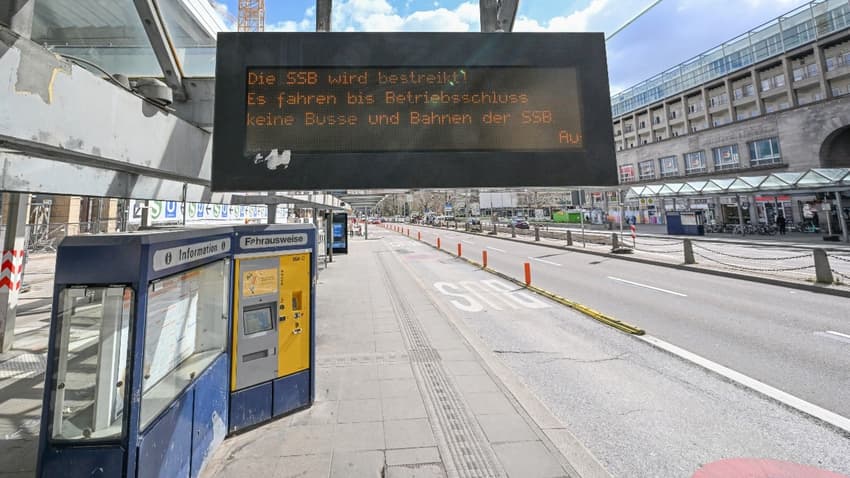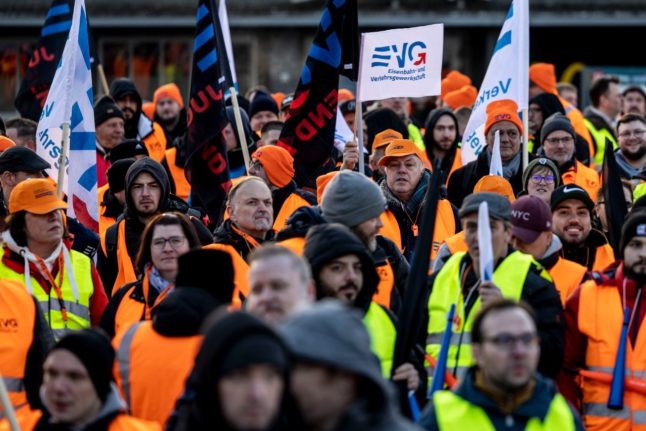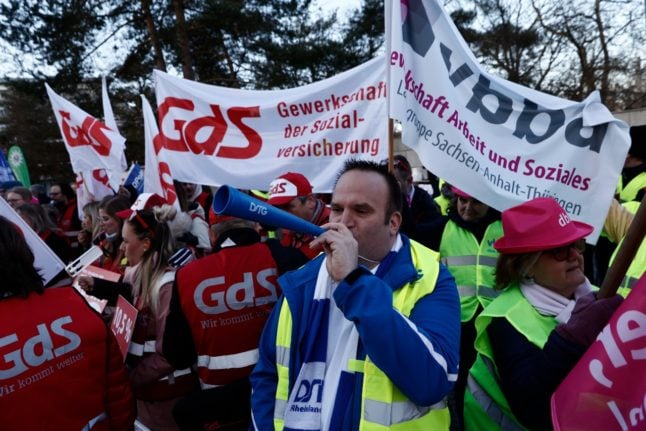Germany hit by major disruption as transport workers stage 'mega strike'

A major strike brought much of Germany's air traffic, rail service and commuter lines to a halt on Monday as workers demand wage hikes in the face of brisk inflation.
The EVG union hailed the mass walkouts as a success.
"We assume that the employers will have understood this clear signal and will now finally present negotiable offers," said EVG's deputyn chairwoman Cosima Ingenschay.
Berlin's usually bustling central train station was mostly quiet, after the national railway cancelled long-distance and regional links across the country.
Arrival and departure boards at Frankfurt airport, the nation's biggest, and Munich airport showed rows of cancelled flights.
Freddie Schwarze, who was on strike at Munich airport, said: "We are ready for more strikes in any case. We have started and we won't stop. That's for sure."
Georg Bachmaier, who works at the Federal Waterways and Shipping Office, said he had joined the walkout because "we can no longer afford our lives".
"When we go shopping, we have to think do we buy this or not, we need the money to finance our lives and that's why we're here."
As the industrial action was largely publicised, many commuters had switched to other modes of transport.
Cashier Steffi Wisser, 46, voiced understanding for the strike.
"People must be made aware of the enormous work done by strikers," she said.
For retiree Gloria Bierwald, 73, however, "the strike goes too far".
"What the strikers are asking for is relatively exaggerated," she told AFP. "I am of the opinion that people should be satisfied when they have a job."
READ ALSO: EXPLAINED: What to expect during Monday's 'mega strike' in Germany
Ill-tempered dispute
To prevent supply gaps, Transport Minister Volker Wissing has ordered states to lift restrictions on truck deliveries Sunday, while asking airports to allow late-night takeoffs and landings "so stranded passengers can reach their destinations".
Verdi represents around 2.5 million public sector employees, while EVG represents 230,000 workers on the railways and at bus companies.
The rare joint call for a strike in Germany marks an escalation of an increasingly ill-tempered dispute over a pay packet to blunt the impact of surging inflation.

Demonstrators from the EVG rail union gather in front of Duisburg Hauptbahnhof on Monday. Photo: picture alliance/dpa | Christoph Reichwein
Employers, mostly the state and public sector companies, have so far refused the demands, instead offering a rise of five percent with two one-off payments of €1,000 and €1,500, this year and next.
Verdi is demanding a rise of 10.5 percent in monthly salaries, while EVG is seeking a 12-percent rise for those it represents.
'Economic hardship'
DB's Martin Seiler, responsible for human resources on the company's management board, described the nationwide strike as "groundless and unnecessary" and urged the unions to return to the negotiating table "immediately".
The German airport association, which estimated about 380,000 air travellers would be affected, said the walkout "went beyond any imaginable and justifiable measure".
Employers have accused labour representatives of contributing to a wage-price spiral that will only feed inflation, while unions say their members have been asked to bear the burden of the soaring cost of living.
Like in many other countries, Germans are struggling with high inflation -- it hit 8.7 percent in February -- after Russia's invasion of Ukraine sent food and energy costs soaring.
The "mega-strike", as local media have dubbed it, follows industrial action in recent months in several German sectors, from the postal service to airports and local transport.
Earlier in March, Bremen, Berlin, Hamburg and Hanover airports cancelled more than 350 flights after security staff walked out. Bus and metro staff in Frankfurt also staged a strike.
A third round of salary negotiations for public sector workers began on Monday and will last until Wednesday.
READ ALSO: IN PICTURES: German workers down tools in unprecedented strike action
Significant wins
Some unions however have succeeded in winning big pay increases.

Workers from various sectors gather at a demo outside the Congress Hotel in Potsdam. Photo: picture alliance/dpa | Carsten Koall
Postal workers won average monthly increases of 11.5 percent earlier in March, and in November IG Metall, Germany's biggest union, won hikes totalling 8.5 percent for almost four million employees that it represents.
Although Monday's walkout has impacted millions of passengers, it pales in comparison to the industrial disputes rocking neighbouring France, where President Emmanuel Macron's pension reform plans have ignited voter anger.
Rubbish is gathering in the streets of Paris due to a rolling strike by garbage collectors, while blockades of oil refineries by striking workers are beginning to create fuel shortages around the country.
READ ALSO: Germany relaxes Sunday lorry ban ahead of strike but traffic jams unlikely
By Clement Kasser with Pauline Curtet in Munich
Comments
See Also
The EVG union hailed the mass walkouts as a success.
"We assume that the employers will have understood this clear signal and will now finally present negotiable offers," said EVG's deputyn chairwoman Cosima Ingenschay.
Berlin's usually bustling central train station was mostly quiet, after the national railway cancelled long-distance and regional links across the country.
Arrival and departure boards at Frankfurt airport, the nation's biggest, and Munich airport showed rows of cancelled flights.
Freddie Schwarze, who was on strike at Munich airport, said: "We are ready for more strikes in any case. We have started and we won't stop. That's for sure."
Georg Bachmaier, who works at the Federal Waterways and Shipping Office, said he had joined the walkout because "we can no longer afford our lives".
"When we go shopping, we have to think do we buy this or not, we need the money to finance our lives and that's why we're here."
As the industrial action was largely publicised, many commuters had switched to other modes of transport.
Cashier Steffi Wisser, 46, voiced understanding for the strike.
"People must be made aware of the enormous work done by strikers," she said.
For retiree Gloria Bierwald, 73, however, "the strike goes too far".
"What the strikers are asking for is relatively exaggerated," she told AFP. "I am of the opinion that people should be satisfied when they have a job."
READ ALSO: EXPLAINED: What to expect during Monday's 'mega strike' in Germany
Ill-tempered dispute
To prevent supply gaps, Transport Minister Volker Wissing has ordered states to lift restrictions on truck deliveries Sunday, while asking airports to allow late-night takeoffs and landings "so stranded passengers can reach their destinations".
Verdi represents around 2.5 million public sector employees, while EVG represents 230,000 workers on the railways and at bus companies.
The rare joint call for a strike in Germany marks an escalation of an increasingly ill-tempered dispute over a pay packet to blunt the impact of surging inflation.

Employers, mostly the state and public sector companies, have so far refused the demands, instead offering a rise of five percent with two one-off payments of €1,000 and €1,500, this year and next.
Verdi is demanding a rise of 10.5 percent in monthly salaries, while EVG is seeking a 12-percent rise for those it represents.
'Economic hardship'
DB's Martin Seiler, responsible for human resources on the company's management board, described the nationwide strike as "groundless and unnecessary" and urged the unions to return to the negotiating table "immediately".
The German airport association, which estimated about 380,000 air travellers would be affected, said the walkout "went beyond any imaginable and justifiable measure".
Employers have accused labour representatives of contributing to a wage-price spiral that will only feed inflation, while unions say their members have been asked to bear the burden of the soaring cost of living.
Like in many other countries, Germans are struggling with high inflation -- it hit 8.7 percent in February -- after Russia's invasion of Ukraine sent food and energy costs soaring.
The "mega-strike", as local media have dubbed it, follows industrial action in recent months in several German sectors, from the postal service to airports and local transport.
Earlier in March, Bremen, Berlin, Hamburg and Hanover airports cancelled more than 350 flights after security staff walked out. Bus and metro staff in Frankfurt also staged a strike.
A third round of salary negotiations for public sector workers began on Monday and will last until Wednesday.
READ ALSO: IN PICTURES: German workers down tools in unprecedented strike action
Significant wins
Some unions however have succeeded in winning big pay increases.

Postal workers won average monthly increases of 11.5 percent earlier in March, and in November IG Metall, Germany's biggest union, won hikes totalling 8.5 percent for almost four million employees that it represents.
Although Monday's walkout has impacted millions of passengers, it pales in comparison to the industrial disputes rocking neighbouring France, where President Emmanuel Macron's pension reform plans have ignited voter anger.
Rubbish is gathering in the streets of Paris due to a rolling strike by garbage collectors, while blockades of oil refineries by striking workers are beginning to create fuel shortages around the country.
READ ALSO: Germany relaxes Sunday lorry ban ahead of strike but traffic jams unlikely
By Clement Kasser with Pauline Curtet in Munich
Join the conversation in our comments section below. Share your own views and experience and if you have a question or suggestion for our journalists then email us at [email protected].
Please keep comments civil, constructive and on topic – and make sure to read our terms of use before getting involved.
Please log in here to leave a comment.